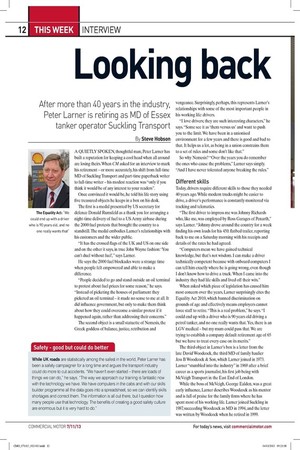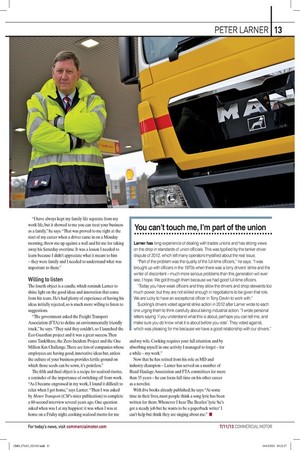Looking back
Page 8

Page 9

If you've noticed an error in this article please click here to report it so we can fix it.
After more than 40 years in the industry, Peter Lamer is retiring as MD of Essex tanker operator Suckling Transport By Steve Hobson
A QUIETLY SPOKEN, thoughtful man, Peter Lamer has built a reputation for keeping a cool head when all around are losing theirs. When CM asked for an interview to mark his retirement — or more accurately, his shift from full-time MD of Suckling Transport and part-time paperback writer to full-time writer — his modest reaction was "only if you think it would be of any interest to your readers".
Once convinced it would be, he told his life story using five treasured objects he keeps in a box on his desk.
The first is a medal presented by US secretary for defence Donald Rumsfeld as a thank you for arranging a night-time delivery of fuel to a US Army airbase during the 2000 fuel protests that brought the country to a standstill. The medal embodies Larner's relationships with his customers and the wider public.
"It has the crossed flags of the UK and US on one side and on the other it says, in true John Wayne fashion: 'You can't duel without fuel'," says Lamer.
He says the 2000 fuel blockades were a strange time when people felt empowered and able to make a difference.
"People decided to go and stand outside an oil terminal to protest about fuel prices for some reason," he says. "Instead of picketing the houses of parliament they picketed an oil terminal — it made no sense to me at all. It did influence government, but only to make them think about how they could overcome a similar protest if it happened again, rather than addressing their concerns." The second object is a small statuette of Nemesis, the Greek goddess of balance, justice, retribution and
vengeance. Surprisingly, perhaps, this represents Larner's relationships with some of the most important people in his working life: drivers.
"I love drivers; they are such interesting characters," he says. "Some see it as 'them versus us' and want to push you to the limit. We have been in a unionised environment for a few years and there is good and bad to that. It helps us a lot, as being in a union constrains them to a set of rules and some don't like that."
So why Nemesis? "Over the years you do remember the ones who cause the problems," Lamer says simply. "And I have never tolerated anyone breaking the rules." Different skills
Today, drivers require different skills to those they needed 40 years ago. While modern trucks might be easier to drive, a driver's performance is constantly monitored via tracking and telematics.
"The first driver to impress me was Johnny Richards who, like me, was employed by Ross Garages of Penarth," says Lamer. "Johnny drove around the country for a week finding his own loads for his 45ft flatbed trailer, reporting back to me on a Saturday morning with his receipts and details of the rates he had agreed.
"Computers mean we have gained technical knowledge, but that's not wisdom. I can make a driver technically competent because with onboard computers I can tell him exactly where he is going wrong, even though I don't know how to drive a truck. When I came into the industry they had life skills and lived off their wits."
When asked which piece of legislation has caused him most concern over the years, Lamer surprisingly cites the Equality Act 2010, which banned discrimination on grounds of age and effectively means employers cannot force staff to retire. "This is a real problem," he says. "I could end up with a driver who is 90 years old driving a petrol tanker, and no one really wants that. Yes, there is an LGV medical — but my mum could pass that. We are trying to establish a company default retirement age of 65 but we have to treat every case on its merits."
The third object in Larner's box is a letter from the late David Woodcock, the third MD of family haulier Jess B Woodcock & Son, which Lamer joined in 1973. Lamer "stumbled into the industry" in 1969 after a brief career as a sports journalist, his first job being with McVeigh Transport in the East End of London.
While the boss of McVeigh, George Ealden, was a great early influence, Lamer describes Woodcock as his mentor and is full of praise for the family firms where he has spent most of his working life. Lamer joined Suckling in 1987, succeeding Woodcock as MD in 1994, and the letter was written by Woodcock when he retired in 1999.
"I have always kept my family life separate from my work life, but it showed to me you can treat your business as a family," he says. "That was proved to me right at the start of my career when a driver came in on a Monday morning, threw me up against a wall and hit me for taking away his Saturday overtime. It was a lesson I needed to learn because I didn't appreciate what it meant to him — they were family and I needed to understand what was important to them." Willing to listen
The fourth object is a candle, which reminds Lamer to shine light on the good ideas and innovation that come from his team. He's had plenty of experience of having his ideas initially rejected, so is much more willing to listen to suggestions.
"The government asked the Freight Transport Association (FTA) to define an environmentally friendly truck," he says. "They said they couldn't, so I launched the Eco Guardian project and it was a great success. Then came TankShare, the Zero Incident Project and the One Million Km Challenge. There are lots of companies whose employees are having good, innovative ideas but, unless the culture of your business provides fertile ground on which those seeds can be sown, it's pointless." The fifth and final object is a recipe for seafood risotto, a reminder of the importance of switching off from work. "As I became engrossed in my work, I found it difficult to relax when I got home," says Lamer. "Then I was asked by Motor Transport (CM's sister publication) to complete a 60-second interview several years ago. One question asked when was I at my happiest: it was when I was at home on a Friday night, cooking seafood risotto for me
and my wife. Cooking requires your full attention and by absorbing myself in one activity I managed to forget — for a while — my work."
Now that he has retired from his role as MD and industry champion — Lamer has served on a number of Road Haulage Association and FTA committees for more than 35 years — he can focus full time on his other career as a novelist. With five books already published, he says: "At some time in their lives, most people think a song lyric has been written for them. Whenever I hear The Beatles' lyric 'he's got a steady job but he wants to be a paperback writer' I can't help but think they are singing about me." •
You can't touch me, I'm part of the union
Lamer has long experience of dealing with trades unions and has strong views on the drop in standards of union officials. This was typified by the tanker driver dispute of 2012, which left many operators mystified about the real issue.
"Part of the problem was the quality of the full-time officers," he says. "I was brought up with officers in the 1970s when there was a lorry drivers' strike and the winter of discontent — much more serious problems than this generation will ever see, I hope. We got through them because we had good full-time officers.
"Today you have weak officers and they allow the drivers and shop stewards too much power, but they are not skilled enough in negotiations to be given that role. We are lucky to have an exceptional officer in Tony Devlin to work with."
Suckling's drivers voted against strike action in 2012 after Lamer wrote to each one urging them to think carefully about taking industrial action. "I wrote personal letters saying if you understand what this is about, perhaps you can tell me, and make sure you do know what it is about before you vote'. They voted against, which was pleasing for me because we have a good relationship with our drivers."
Safety good but could do better
While UK roads are statistically among the safest in the world, Peter Lamer has been a safety campaigner for a long time and argues the transport industry could do more to cut accidents. "We haven't even started —there are loads of things we can do," he says. "The way we approach our training is fantastic now with the technology we have. We have computers in the cabs and with our skills builder programme all the data goes into a spreadsheet, so we can identify skills shortages and correct them. The information is all out there, but I question how many people use that technology. The benefits of creating a good safety culture are enormous but it is very hard to do."








































